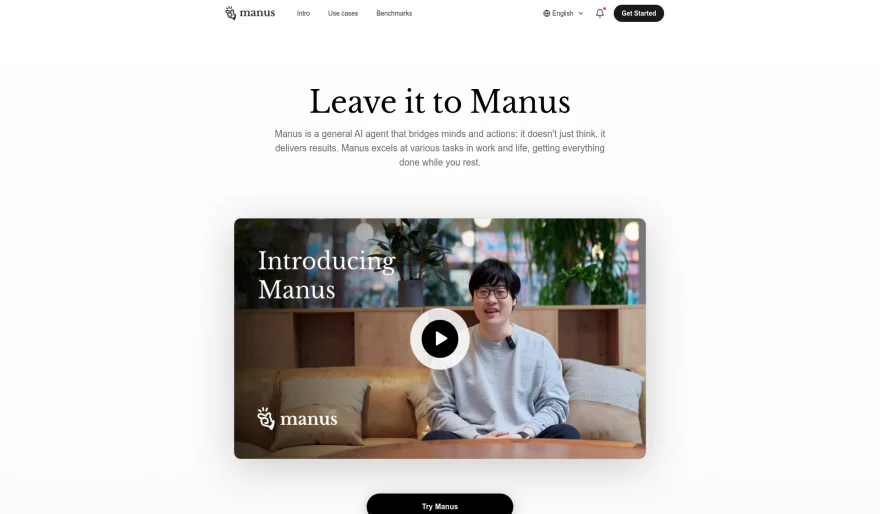Stay Ahead of the Curve
Latest AI news, expert analysis, bold opinions, and key trends — delivered to your inbox.
Manus AI: China's Leap Towards General AI Agents
45 min read Unlike traditional AI assistants or chatbots that primarily generate responses or suggestions, Manus is designed to deliver tangible results by autonomously completing multi-step tasks. March 08, 2025 12:33
Manus AI represents a significant development in China's rapidly advancing artificial intelligence landscape, often described as a potential "leap" toward general AI agents. Launched on March 6, 2025, by a Chinese startup called Monica.im, Manus is positioned as the world’s first fully autonomous general AI agent, capable of independently thinking, planning, and executing complex real-world tasks. This debut has sparked widespread attention, drawing comparisons to earlier Chinese AI breakthroughs like DeepSeek’s R1 model, which stunned the global tech community in January 2025 with its cost-effective yet powerful Large Language Model (LLM).
What is Manus AI?
Unlike traditional AI assistants or chatbots that primarily generate responses or suggestions, Manus is designed to deliver tangible results by autonomously completing multi-step tasks. According to its developers, it "bridges minds and actions," going beyond mere ideation to execution. Examples of its capabilities include:
- Creating a custom website step-by-step.
- Devising a detailed itinerary for a trip to Japan.
- Conducting in-depth financial analysis, such as evaluating Tesla’s stock.
- Designing interactive courses for middle-school teachers.
- Comparing insurance policies or assisting with business-to-business supplier sourcing.
These tasks showcase Manus’s ability to interact with its environment, browse websites, gather data, and utilize tools in real time, all while displaying its workflow transparently. A notable feature is its asynchronous cloud-based operation, allowing users to assign tasks and disconnect, with Manus delivering results later—a practical advantage for efficiency.
Technical Claims and Performance
Manus has garnered attention for its reported performance on the GAIA benchmark, a third-party evaluation system designed to test general AI assistants on real-world problem-solving. The benchmark, introduced in 2023 by teams from Meta AI, Hugging Face, and others, assesses capabilities like reasoning, web browsing, tool usage, and multi-modal handling across three difficulty levels. Manus claims to have achieved state-of-the-art (SOTA) results across all levels, surpassing OpenAI’s offerings, including its Deep Research tool. While specific scores aren’t widely detailed in public sources, this claim has fueled excitement and skepticism alike, positioning Manus as a potential competitor to global AI leaders.
The system reportedly employs a multi-agent architecture, where independent models collaborate within virtual machines to handle specialized functions like planning, memory, and execution. This "less structure, more intelligence" approach prioritizes data quality, model power, and flexible design over rigid, predefined features, allowing capabilities to emerge organically. The developers also plan to open-source parts of the model, particularly its inference component, later in 2025, which could accelerate innovation in the AI agent space.
The Team Behind Manus
Manus was developed by Monica.im, a Beijing- and Wuhan-based startup founded by Xiao Hong, a 1992-born entrepreneur and Huazhong University of Science and Technology graduate. Xiao has a track record in AI, having founded Ye Ying Technology in 2015 and later launching Monica, an AI assistant that integrates models like Claude 3.5 and DeepSeek, amassing over a million users globally. The Manus project, a year in the making, is led by co-founder and chief scientist Ji Yichao (also known as "Peak"), a 33-year-old tech enthusiast previously involved with Peak Labs in the U.S. and creator of the Mammoth mobile browser. Despite its low-profile beginnings, the team’s work has catapulted them into the spotlight.
Reception and Impact
Since its preview launch, Manus has gone viral, particularly in China, trending on platforms like Weibo with millions of views and thousands of comments. A four-minute demo video, released on March 5, 2025, garnered over 200,000 views on X within hours, showcasing tasks like screening resumes or generating reports autonomously. The hype led to a frenzy for invitation codes—required due to its beta status and limited server capacity—with some codes reportedly resold on platforms like Xianyu for prices ranging from 999 yuan ($137) to as high as 50,000 yuan ($6,900).
The launch aligns with a broader wave of AI innovation in China, following DeepSeek’s cost-efficient LLM breakthrough. Industry observers have dubbed it "another DeepSeek moment," highlighting China’s ability to produce cutting-edge AI at a fraction of Western costs. This has sparked both excitement and skepticism, with some questioning whether Manus’s capabilities match the hype, given its limited public access and the suspension of its official X account on March 7, 2025, for unspecified rule violations.
Broader Implications
Manus’s emergence reflects a global shift toward AI agents—autonomous systems that go beyond conversation to perform practical tasks. This trend is evident in OpenAI’s concurrent announcement of a $20,000/month enterprise-grade AI agent for industries like finance and healthcare, suggesting a competitive race in this domain. In China, Manus could herald a new ecosystem for AI applications, potentially rivaling AI-powered search as a dominant use case. Analysts predict that by 2026, over 80% of enterprises may integrate such agents into workflows, up from 21% in 2024, per Gartner’s estimates.
For China, Manus underscores its growing AI prowess, challenging Western dominance and reinforcing its position in the global tech race. However, with the product still in its infancy and server constraints limiting testing, its true potential remains under scrutiny. As the team scales capacity and refines the system, Manus could either solidify China’s leap toward general AI agents or face challenges in meeting sky-high expectations. For now, it’s a bold step forward, blending innovation with ambition in a field poised to reshape how we work and live.
User Comments (0)
No comments added yet.
Comments will not be approved to be posted if they are SPAM, abusive, off-topic, use profanity, contain a personal attack, or promote hate of any kind.



















 AI Agents
AI Agents